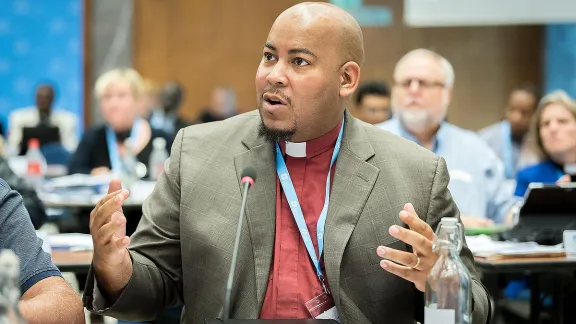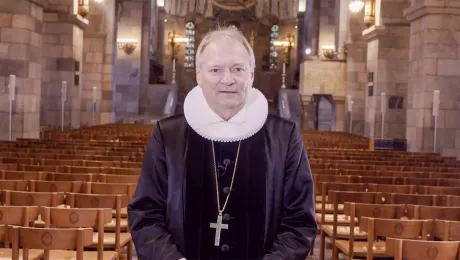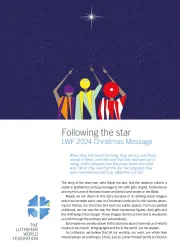
LWF Council member Rev. William Flippin Jr. Photo: LWF / Albin Hillert
Voices from the Communion – Rev. William Flippin Jr
Rev. William Flippin Jr is a strong advocate of ecumenism. In addition to serving as a pastor at his church in Atlanta, United States, he sits on the council of the Evangelical Lutheran Church in America and is vice-chair of the ad hoc committee for advocacy and public voice on the LWF Council.
What is the ELCA view on ecumenism?
All our work is grounded in our statement “…that they may all be one.” (John 17:21). The ELCA endeavors to achieve this in its ecumenical work by building organic relationships. So many other churches are quick to defend their positions on points of doctrine and practice. We cooperate with many global partners, such as the Lutheran World Federation, the World Council of Churches and the National Council of the Churches of Christ in the USA. This work is carried out through church-wide ministries and campaigns, such as Shoulder to Shoulder, an inter-faith campaign with Muslims that promotes dialogue. Ecumenism is the posture of glorification and love.
What dialogue processes is the ELCA part of and how do these strengthen the global communion?
The ELCA takes pride in the efforts of the 50 years of Lutheran-Catholic dialogue commemorating the 500th year of the Reformation and following the Joint Declaration on the Doctrine of Justification. The Declaration on the Way, by the US Catholic-Lutheran Dialogue Commission, continues this progression. It says there are 32 consensus statements affirming there are no schematic doctrines between Catholic and Lutherans. The document points out remaining differences but suggests ways of moving forward following the visible Christian unity found in Christ's prayer. This strengthens the global communion by modeling the posture of dialogue to fulfill the work of the kingdom.
How do you see ecumenism developing in the future?
From the examples displayed from the ELCA and my work with the LWF Council, I am very optimistic about the future of ecumenism. Within the Council, that closely resembles the glory of unity that Jesus talks about in John. It is a reflected glory, an angled mirror that reflects God's love to the world through Jesus to us and through us to the world, which, in turn, reflects glory back to God.
Economic justice is a great concern of yours. How do you see the new LWF strategy enhancing the work of the communion in terms of economic justice?
From section 6.2 of the LWF strategy comes the mandate to promote human dignity, justice and peace. This affirms the commitment to strengthen local and global advocacy to promote human rights and protect the rights of marginalized communities. We will be proactive on issues of justice, addressing economic inequality. This strategy will give the LWF a more visible presence in global realities.
What does economic justice mean in a US context and how does the work of the ELCA support economic justice?
Economic justice in the US still leaves a lot to be desired. The wealthy have benefited from the American dream. Historically, the fabric of our history has been one of taking land from Native Americans, yet giving them germ-infested blankets, in what is known as the Trail of Tears. The recent tax bill passed by Congress will not only reduce but eliminate primary health care that was set up to ensure life, liberty and the pursuit of happiness. The ELCA is committed to confronting barriers - racial, ethnic, cultural, religious, age, gender, familial, sexual orientation, physical, personal and class that often manifest in unjust treatment, inequality, exclusion and violence. The ELCA works through various ecumenical networks, public witness and in moving toward fairness and justice in the church and society. The ELCA social statement, Freed in Christ: Race, Ethnicity and Culture offers a theological reflection on the church’s commitment to undo racism and move toward reconciliation, healing and embracing all people.
The Lutheran World Federation is a global body that shares the work and love of Christ in the world. In this series, we profile church leaders and staff as they discuss topical issues and set out ideas for building peace and justice in the world, ensuring the churches and communion grow in witness and strength.


